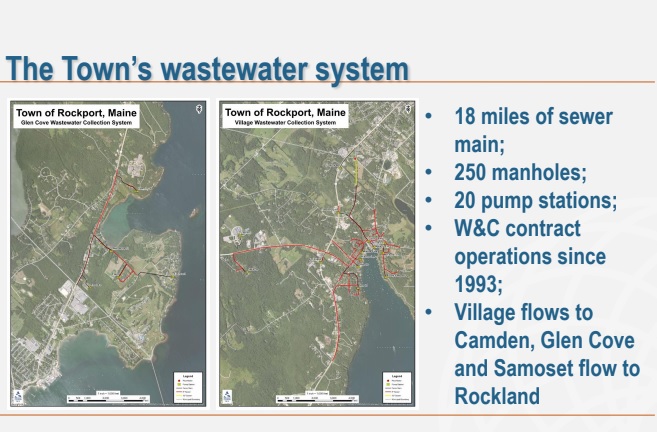ROCKPORT — Acting in their as Wastewater Commissioners, members of the Rockport Select Board voted unanimously Nov. 23 to approve a comprehensive study that is to examine the town’s current wastewater treatment plan, as well as explore options including building a new treatment plant.
The study will cost $10,000 and will be completed by Woodard & Curran, the company that has held a contract with the town to oversee Rockport’s wastewater treatment and disposal facilities since 1993.
Town Manager Bill Post said that the fee for the study will be paid from the wastewater line of the town’s capital budget.
The decision to have the study performed, and to examine the town’s existing 18 miles of sewer main, was precipitated by a presentation by Woodward & Curran (W&C) earlier this month, when Select Board members raised concerns over the amount of money spent each year by the town to have it’s wastewater treated or disposed by neighboring facilities in Camden and Rockland.
On Monday night, Nov. 23, board members Denise Kennedy-Munger and Jeff Hamilton considered whether or not it would be practical or economical for the town to build it’s own wastewater treatment facility, rather than continuing it’s interlocal agreement with Camden and Rockland.
“What I thought I was hearing was that what we pay W&C now to operate our system, which is really getting everything to Camden and Rockland, would essentially be the same cost as what W&C would charge us to to operate our own sewage treatment facility, even if we needed two of them –north and south– to accommodate the way our sewer system is currently [arranged],” said Kennedy-Munger.
“I didn’t get that...you would have to have 24-hour coverage, you wouldn’t be able to have anybody work alone...you would have the operating costs, chemicals for wastewater treatment we would have to purchase,” said Hamilton.
“We’ve got some ideas about why our system is so expensive, we’ve got the contracts and things we need to work on with that, but there might be some things we could understand better because we do have the highest sewage rates in the area,” said Kennedy-Munger.
She added that the town currently pays W&C approximately $300,000 annually for its services.
The study the board elected to have W&C perform includes performing a sewer user charge/flow appropriation calculation, within which the firm would review the the rate structure pertaining to the interlocal agreements with Camden and Rockland.
Parcels of land would be identified upon which a wastewater treatment facility could be built, and a “lifecycle” costa analysis would be performed on the existing technology, pipes, and 20 pumping stations in Rockport. Preliminary engineering cost estimates for a new wastewater treatment facility would also be included.
“The original interlocal agreements with Camden and Rockland were established in 1990 and 1992, respectively. Both agreements had a duration of 30 years, which means the original agreement with Camden expired in February of 2020 and the agreement with Rockland is due to expire in November of 2022,” wrote Nate McLaughlin, a principal at W&C in a September letter to Post, outlining the scope of services included in the $10,000 study.
Post said that the work that W&C will complete during their study of the town’s current wastewater infrastructure would help the town better understand their current operating system and the costs associated with it, regardless of whether or not a new, standalone treatment facility is constructed.
He said a study with this kind of a scope had not been performed in Rockport before. He said the report would also include installation and operating costs for a new treatment plant.
Selectman Mark Kelley asked if any portion of the study would help the town identify existing flow problems in the municipality.
“I understand the need for [the study], but we can’t quite find out what’s wrong with the system we have now and we don’t have a plant... I think the study would be beneficial to have for future reference, but here we are talking about having a [water treatment] plant or possibly two, and we can’t even figure out what our inflow problem is now,” said Kelley.
“I think what we’re going to find in this study is that the dollar figure will scare us all to death capitol and in operating costs, but what that will do is drive us to a higher level of fixing what’s wrong in our current state and perhaps better negotiate with those that are treating our wastewater,” said Hamilton.
Post said the study would take two months to complete.
On Nov. 3, McLaughlin appeared before the Select Board and said that Rockport consists of 644 users users in the wastewater system which is treated by Camden or Rockland.
He said the town’s annual budget for sewer fees is broken up into two categories: Debt service and user fees.
Rockport’s wastewater debt service is approximately $644,000 or a cost of $274 per year for each user.
This includes $40,000 from the capital reserve, $276,000 from the town’s debt service and $328,000 from the capital improvement plan.
Usage fees, which are based on metered water usage, total approximately $1 million in Rockport, or a cost of $18 per 100 cubic feet of water.
This includes $572,000 in wastewater disposal, $291,000 in operating costs, and $110,000 in ‘other operations.’ Rockport has budgeted $571,800 in the 2021 fiscal year for wastewater payments to Camden and Rockland.
The next meeting of the Rockport Select Board will be held Monday, Dec. 14 at 5:30 p.m.



























